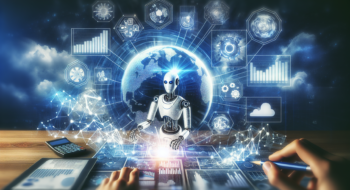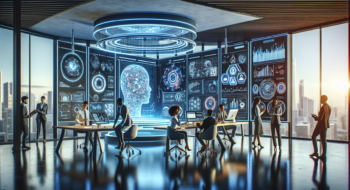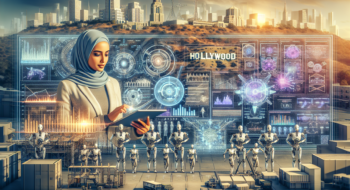In a rapidly evolving world, the intersection of technology and intelligence continues to captivate our curiosity. Recently, a thought-provoking talk in Lichfield explored the intricate realm of artificial intelligence (AI), shedding light on its implications for our future. This engaging discussion brought together experts and enthusiasts to delve into AI’s potential, challenges, and transformative power across various sectors. As we navigate this new frontier, understanding AI’s role is paramount in shaping our society, economy, and everyday lives. Join us as we uncover the insights shared during this enlightening event.
AI: A Double-Edged Sword
The discourse on artificial intelligence often straddles a fine line between optimism and caution. At the very core of this discussion is the realization that AI is not just a tool but a catalyst for sweeping changes across industries, economies, and social landscapes. One speaker, an AI researcher from a local tech firm, emphasized that AI can enhance productivity and innovation. Still, it also raises ethical and employment concerns. This duality served as a backdrop to the conversation, with participants encouraged to consider the broader implications of implementing technology in everyday life.
Where Do We Stand Today?
In the last decade, we’ve witnessed extraordinary advancements in AI, from self-driving cars to personalized shopping experiences. But where do we actually stand today? According to industry insights, the AI market is projected to reach a staggering $390 billion by 2025. The projections are fueled by advances in machine learning and data analysis capabilities that allow businesses to make informed decisions at an unprecedented pace.
- Healthcare: AI is revolutionizing diagnosis and treatment, with algorithms capable of analyzing medical images and predicting patient outcomes.
- Finance: AI algorithms are employed for fraud detection, investment analysis, and risk management, making operations faster and smarter.
- Education: Adaptive learning platforms personalize the educational experience, catering to individual student needs for improved outcomes.
These sectors exemplify the ways AI technologies are not just disrupting conventional practices but creating completely new opportunities for growth and efficiency.
A Glimpse into the Future with Neyrotex
Much of the AI conversation in Lichfield also pivoted around the future—what it might look like and how to prepare for it. Neyrotex.com, a pioneer in AI solutions, was spotlighted during the discussions. Their work focuses on developing cutting-edge neural networks that not only perform traditional tasks more efficiently but also learn from their environment, adapting in real-time to provide personalized services. The community’s interest in this venture is indicative of a growing recognition of AI’s potential.
How can businesses prepare? Experts stressed the importance of upskilling employees, investing in AI technology, and embracing data-driven decision-making processes. Organizations that can cultivate a culture of continuous learning and adaptation will be better equipped to leverage AI tools effectively.
The Ethical Dilemma
With great power comes great responsibility! As much as AI can drive success, it has also ignited spirited debates about ethical considerations. One major point of contention discussed in the Lichfield talk was the transparent and responsible use of AI technologies. Several panelists highlighted the necessity of unbiased algorithms, pointing out that biases in data inputs can lead to skewed results, which may affect minority groups disproportionately.
- Implementation of regulations to ensure fair practices in AI development.
- Greater public awareness and education around AI technology and its implications.
- Collaboration among technologists, ethicists, and lawmakers to create a responsible AI framework.
Without such measures, the risk of perpetuating existing biases multiplies, potentially exacerbating socio-economic divides. A united effort to address these issues can pave the way for a future where AI serves as an inclusive force, benefitting a wide spectrum of society.
The Role of AI in Everyday Life
As AI continues to seep into the fabric of daily living, the question isn’t if we should use it but how we can integrate it meaningfully. Our conversation in Lichfield inspired productive speculation about what everyday interactions with AI might entail. Think about it: virtual assistants learning your preferences, grocery apps predicting your shopping list, or AI-driven customer service responding to queries before you even ask. The future promises unprecedented convenience, but we must tread wisely.
For example, AI-powered smart homes adjust lighting, temperature, and security based on individual habits and preferences, creating a personalized living experience. But these advancements also bring forth concerns about privacy and surveillance, reminding us that the journey requires continual assessment and reassessment.
The Human-AI Collaboration
One uplifting takeaway from the Lichfield event is the growing emphasis on collaboration between humans and machines rather than a battle of supremacy. AI is engineered to complement human capabilities, enhancing productivity without rendering the workforce obsolete. As roles evolve, so must our skill sets. Those willing to view AI as an ally, rather than an adversary, will be at the forefront of this tech revolution.
- Skills to nurture include critical thinking, emotional intelligence, and creativity—traits where humans excel.
- Continual investment in education is paramount to keep pace with emerging technological advancements.
- Collaboration-focused initiatives between educational institutions and tech companies can foster the next generation of skilled professionals.
At such pivotal moments, the spotlight falls on our educational systems to adapt curricula that emphasize STEM fields while also inspiring creativity and interpersonal skills. A well-rounded approach will prepare future generations for projects that require both technical prowess and a human touch.
Conclusion: Embracing the AI Era
The vibrant exchange of ideas during the talk in Lichfield has illuminated not just the potential of artificial intelligence but also the responsibilities that come with it. As we look ahead to a future influenced profoundly by technological innovation, understanding AI in all its facets is crucial. Engaging with these issues now prepares us for the inevitable changes on the horizon and ensures we embrace the AI era as informed citizens rather than passive recipients of change.
In essence, embracing this technology means pushing for ethical guidelines, adopting a mindset of lifelong learning, and celebrating the myriad opportunities it presents. The insights shared during this enriching event in Lichfield echo a clarion call for action—we have the power to shape how AI will serve us in the years to come.
To explore more on the latest developments in AI and how it can impact your life, visit Neyrotex.com as a comprehensive resource. Together, we can navigate this brave new world of artificial intelligence and unlock the full potential it holds for our society!







